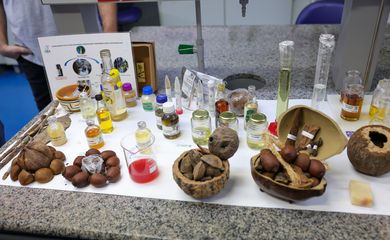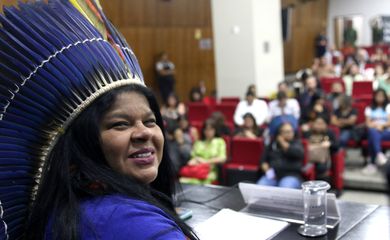COP16: Minister Silva urges remuneration for traditional communities

Brazil’s Minister for the Environment and Climate Change Marina Silva argued that traditional communities should have access to funding as recompense for the protection of the planet’s biodiversity, under the terms of the Convention on Biological Diversity.

The statement was made Tuesday (Oct. 29) during a speech at the high-level segment of the United Nations Conference on Biodiversity, COP16, which is taking place in Cali, Colombia.
The benefits of the exploration of natural heritage products and associated traditional knowledge, the minister went on to argue, must be fairly shared.
“Indigenous peoples and traditional communities, including groups of people of African descent, are the true guardians of our ecosystems. That’s why they deserve more effective participation in the convention, especially in decisions regarding the recognition and the fair sharing of the benefits of the use of genetic heritage. This includes rights arising from access to digital sequence information. We need to reach an agreement at COP16 on this absolutely unquestionable right,” she declared.
Funding the preservation of biodiversity is one of the deadlocks under discussion. The idea is for a digital sequence information fund to be set up to protect this genetic heritage, including remuneration for forest communities.
At the conference, the position of traditional communities is being outlined by the Indigenous Caucus—a group of around 500 indigenous representatives and members of local community organizations from different regions of the world who seek to guarantee their full and effective participation in the talks. One of their proposals is that the funds should allocate a third of the resources to indigenous peoples.
Another impasse is the inclusion of the nomenclature of collectives of Afro-descendant peoples—like “quilombola”—in the terms of the convention. The initiative comes from Colombia and has the support of the Brazilian government.
Other initiatives
In her speech at COP16, Minister Marina Silva highlighted the country’s other initiatives, especially the Tropical Forests Forever Facility, which aims to generate a permanent flow of financial support for tropical countries that conserve their forests, for the benefit of all humanity.
Earlier in the day, five new countries (Germany, Colombia, the United Arab Emirates, Malaysia, and Norway) announced they had joined the facility, which has been promoted by the Brazilian government as part of its pro-tempore presidency of the G20.
Brazil, the minister further noted, promoted a dialogue between finance, climate, and environment ministers for the first time, also at the G20, and adopted 10 high-level bioeconomy principles. To implement Brazil’s goals, she said, “we have developed several initiatives, such as the ambitious National Native Vegetation Recovery Plan, with 12 million hectares, and the Amazon Protected Areas Program, which now, in a new phase, will promote the socio-economic inclusion of local communities. We will also conclude our National Biodiversity Strategy this year,” she added.
COP for Biodiversity
COP for Biodiversity is one of the spin-offs of the United Nations Conference on Environment and Development, held in Rio de Janeiro in 1992, known as Eco-92 and considered one of the most important international instruments for the environment.
Since then, targets have been regularly updated by the UN countries. By 2023, 23 goals had been set to halt and reverse the loss of biodiversity and set nature on a path to recovery for the benefit of the global population, conserving and sustainably using biodiversity and ensuring the fair and equitable distribution of the benefits from the use of genetic resources.
Another vital COP on the environment is the Climate Conference, whose main objective is to stop the planet from warming, and involves a series of globally agreed-upon targets. Climate COP29 will be held in Baku, Azerbaijan, in 2024. Next year, COP30 will be hosted by the Brazilian government in Belém.







